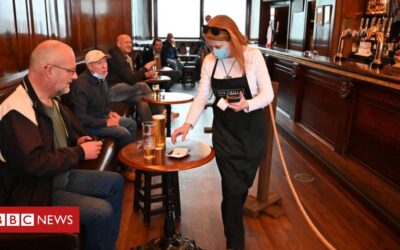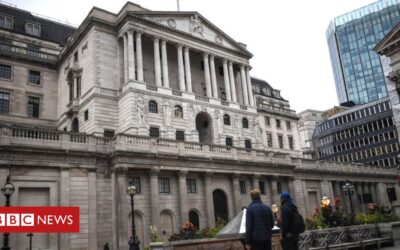Bakery chain Greggs has hinted at possible job cuts as the government’s furlough scheme ends.The company, which employs 25,000 workers, expects business activity to “remain below normal for the foreseeable future”.It said it had reviewed staff costs and was currently consulting with unions and employee representatives.Greggs said it wanted to reduce the risk of job cuts by putting people on reduced hours.However, it is not clear if the company will use the government’s new Job Support Scheme where employers and the state top up workers’ pay who are on fewer hours.The scheme will replace the existing furlough programme which is coming to an end on 31 October. The vast majority of Gregg’s 25,000 workforce had been placed on furlough during lockdown.In a trading statement, Greggs said: “With the Job Retention Scheme planned to end in October we are taking steps to ensure that our employment costs reflect the estimated level of demand from November onwards.”The company said that since reopening all its shops in July, like-for-like sales in the three months to 26 September have averaged 71.2% of the levels recorded in the same period last year.Greggs said sales in September were above that average, with a recovery in customer visits.However, it said August was a difficult month because of high temperatures and it was unable to take part in the government’s Eat Out to Help Out scheme because its shops with seating were closed.
BBC Business News Articles
Coronavirus: Early pub closing 'putting shop workers at risk'
Shop workers are being put at greater risk of violence, verbal abuse and coronavirus infection by pubs shutting at 10pm, a retail union has warned.Usdaw said stores remaining open until later in England were likely to become “very busy” with people buying alcohol, “triggering” antisocial behaviour.Early pub closing was brought in last week in an effort to curb increasing rates of coronavirus.The government said it had taken “immediate action” to “save lives”.Under the restrictions, which also apply in Scotland, pubs, bars and restaurants must shut no later than 10pm.Shops in England can continue selling alcohol until later.On Monday, Greater Manchester’s Labour mayor Andy Burnham said supermarkets, convenience stores and off-licences were now “packed out to the rafters” after closing time.Usdaw general secretary Paddy Lillis told the BBC the situation had left him “deeply concerned” for staff.He added: “Sale of alcohol has always been a major flashpoint for violence, threats and abuse against shop workers, whether it’s age-identification or refusing a sale to someone who is already drunk, which are both legal requirements.”Additional problems arise when licensing laws are not the same as shop opening hours or off-sales licensing hours are longer than on-sales.”In Wales, under current rules, pubs must stop serving by 10pm and close 20 minutes after that. Shops also have to stop selling alcohol by 10pm.Mr Lillis urged the government and councils in England to “ensure that when they bring in new rules they consider the impact on retail and the staff”.”Stores in town and city centres are particularly at risk of becoming very busy late at night and that could make it more difficult for our members to enforce social distancing, which is essential for keeping staff and customers safe,” he said.Restricting coronavirus transmission would “not be achieved by filling shops with late-night revellers”, Mr Lillis added.’Constant review’Labour has questioned whether closing pubs earlier will help contain the spread of coronavirus.But a government spokesperson said: “These measures strike a balance between saving lives by protecting our NHS and the most vulnerable and minimising the wider impact on the economy and schools. “The latest data suggests a considerable rise in the infection rate from within the hospitality sector in recent weeks, so we have taken immediate action to cut the transmission rate and save lives. As with all measures, we will keep them under constant review.”Last week, Prime Minister Boris Johnson said: “What we’ve seen from the evidence is that the spread of the disease does tend to happen later at night after more alcohol has been consumed.”For pubs in Northern Ireland, closing time remains at 11.30pm, although First Minister Arlene Foster said last week that no decision had been reached on imposing extra restrictions.
Covid: Adults without A-levels to be offered free college courses
Adults in England without an A-level or equivalent qualification will be offered a fully funded college course, the government has announced.The offer will be available from April and applies to courses offering “skills valued by employers”.In a speech on Tuesday, the PM will say the government cannot “save every job” amid the coronavirus pandemic, but wants to help people find new work.Labour said the plans would not reverse the impact of “a decade of cuts”.The government decision comes amid fears that unemployment is set to grow sharply.The Office for Budget Responsibility has said the unemployment rate could peak at between 9.7% to 13.2% in the next few years. The most recent rate – for May to July – is 4.1%.In his speech, Boris Johnson will say: “As the chancellor has said, we cannot, alas, save every job – what we can do is give people the skills to find and create new and better jobs.”We’re transforming the foundations of the skills system so that everyone has the chance to train and retrain.”It comes as:The number of people worldwide who have died from Covid-19 passes one million, researchers say, with many regions still reporting surging numbers of new infections.
It will be illegal from midnight for people in large parts of north-east England to mix with other households indoors, as part of tougher coronavirus restrictions announced by Health Secretary Matt Hancock.
Conservative backbenchers demanding votes in Parliament before any further coronavirus restrictions are introduced in England say they are hopeful an agreement can be reached with the government. Some MPs were invited to meet Matt Hancock on Tuesday, and said last night that progress was being made.
Education Secretary Gavin Williamson is due to make a statement in the House of Commons later as thousands of students have been told to self-isolate following a surge in cases at universities.
Retail union Usdaw says shop workers are being put at greater risk of violence, verbal abuse and coronavirus infection as a result of pubs shutting at 10pm.
The offer of courses to adults without an A-level will be paid for through the National Skills Fund topped up with £2.5bn, the government said.A full list of available courses will be announced next month.The government added it wanted to make higher education loans more flexible, with the aim of letting people “space out” their learning throughout their lives rather than in three- or four-year blocks, enabling more part-time study.It said the changes would be backed by investment in college buildings and facilities, including more than £1.5bn in capital funding.Further details will be set out in an education white paper later in the year.In other plans, small businesses will be offered financial incentives to take on apprentices and £8m will be spent on skills “boot camps” in West Yorkshire, south-west England, Derbyshire and Nottinghamshire to cover sectors like construction and engineering.This follows pilots in Greater Manchester and the West Midlands that focused on digital skills. And the government’s online Skills Toolkit, a collection of training resources launched in the spring to help people acquire jobs skills ahead of businesses reopening, will be expanded to include 62 additional courses.Responding to the government’s measures, Labour’s shadow education secretary Kate Green said: “A week ago Labour called for a National Retraining Strategy fit for the crisis Britain faces, but what the government proposes is simply a mix of reheated old policies and funding that won’t be available until April. “By then many workers could have been out of work for nearly a year, and the Tories still think that they will need to take out loans to get the training they will need to get back in work.” She added the plans would not give workers “the skills and support they need in the months ahead”. CBI director general Dame Carolyn Fairbairn said the “significant” unemployment coronavirus is leaving in its wake “only accelerates the need for people to develop new skills and adapt to new ways of working”.”The lifetime skills guarantee and flexible loans to support bitesize learning are a strong start but to really shift gears, this must be backed up by meaningful progress on evolving the apprenticeship levy into a flexible skills levy,” she added. The apprenticeship levy – introduced in 2017 – takes 0.5% of the salary bill from major employers that have an annual pay bill over £3m, with the intention of using the money to improve skills and provide training.ASK MARTIN LEWIS: Is there a silver lining to a Covid Christmas?
CRAFT BEER AND COVID-19: How is the brewing industry coping during the pandemic?
'I monitor my staff with software that takes screenshots'
Shibu Philip admits he knows what it’s like to “maybe waste a bit of time at work”.Shibu is the founder of Transcend – a small London-based firm that buys beauty products wholesale and re-sells them online.For the last year and a half he has used Hubstaff software to track his workers’ hours, keystrokes, mouse movements and websites visited. With seven employees based in India, he says the software ensures “there is some level of accountability” and helps plug the time difference.”I know myself. [You can] take an extra 10-minute break here or there. It’s good to have an automatic way of monitoring what [my employees] are up to,” says Shibu.”By looking at screenshots and how much time everyone is taking on certain tasks, I know if they’re following procedures.”And, if they’re doing better than I expected, I also study the photos and ask them to share that knowledge with the rest of the team so we can all improve,” he says.Employees are fully aware that the software is in use and can delete time spent visiting websites that might have been logged by accident during their break, for example, Shibu adds.Home ‘shirkers’?With more of us than ever working from home during the coronavirus pandemic, there has been a spike in demand for software that monitors employee activity.US-based Hubstaff says its number of UK customers is up four times year-on-year since February.
Media playback is unsupported on your device
Another company called Sneek offers technology that takes photos of workers through their laptop and uploads them for colleagues to see. Photos can be taken as often as every minute, although it describes itself as a communication platform. Its co-founder, Del Currie, told the BBC that it had seen a five-fold increase in its number of users during lockdown, taking the firm to almost 20,000 in total.A recent study by academics at Cardiff University and the University of Southampton found that a common fear among bosses is that out-of-sight workers will “shirk”, although lockdown didn’t actually appear to have had much of an effect on output either way.The survey also suggested that a third of home workers felt that their productivity had fallen too.But is technology the answer to either catch out those who might be slacking off or to help those struggling to adjust to working from the kitchen table full-time?’I would have felt bad if somebody was tracking me’Josh, a 26-year-old photographer living in London, admits that the thing he found hardest about working from home was the drop in his productivity.Setting up a makeshift studio in the kitchen of his three-bedroom flatshare was logistically challenging but he also struggled with motivation.”Some days I would get through everything, but others I would sit and stare at a pair of sandals for a while just thinking, ‘I can’t do this.’ It’s too easy to just go and put the washing on, or make a cup of tea – you find ways to distract yourself quite easily.”He is grateful his boss doesn’t use any tracking software on him. “Those days when it was a bit harder to be motivated, I would have felt bad if I knew somebody was tracking my productivity,” he says.Josh has long suspected that he has attention deficit hyperactivity disorder (ADHD), which can make it difficult to concentrate and manage his time. His doctor agrees, although he’s still on a waiting list for a test. Having returned to the office recently, he is valuing having some more face-to-face interaction. “I find a routine, structure really anchoring and it helps me get through it all.”Monitoring must be ‘proportionate’While some bosses who use these types of software might argue that it’s good for maintaining productivity, research by the Chartered Institute of Personnel and Development (CIPD) suggests that workplace surveillance can damage trust.”Monitoring employee behaviour can be a justifiable way to reduce the risk of misconduct and potentially help manage performance,” says Jonny Gifford, senior adviser for organisational behaviour research at the CIPD.”However, employers should have clear policies so that workers know how they may be monitored, and crucially, it must be proportionate.” Employers will get “much better results” by supporting employees, he adds, “rather than focusing on potentially irrelevant measures of input, such as the number of keystrokes”.Jonathan Rennie, partner at UK law firm TLT, also urges caution for firms considering introducing such software.”Employers have an implied legal duty to maintain their employees’ trust and confidence, and need to be mindful of how employees might react to the mass roll-out of monitoring software,” he says.He suggests that any firms using monitoring software should have written policies in place explaining how and why it is being used.There should also be clear guidance for managers and safeguards in place to prevent misuse or “over-monitoring”, he says.Does your employer track your productivity at home? How would you feel about being monitored? Share your experiences by emailing [email protected] include a contact number if you are willing to speak to a BBC journalist. You can also get in touch in the following ways:WhatsApp: +44 7756 165803
Tweet: @BBC_HaveYourSay
Please read our terms & conditions and privacy policy
If you are reading this page and can’t see the form you will need to visit the mobile version of the BBC website to submit your question or comment or you can email us at [email protected]. Please include your name, age and location with any submission.
Covid: Public spending rise could last longer
The government must choose this autumn between more austerity and permanently higher spending, experts warn.Although the Autumn Budget has been cancelled, the Treasury is still set to publish a Spending Review containing government expenditure plans.Because of Covid-19, public spending is likely to rise to the highest share of national income in more than a decade, says the Institute for Fiscal Studies.If not, another bout of austerity will hit many public services, it warns.A Treasury spokesperson said: “The Spending Review will proceed this autumn, as planned. The chancellor has already confirmed that departmental spending will increase above inflation – both for day-to-day spending and longer-term investment.”The IFS forecasts come in a newly published advance chapter of its Green Budget 2020, which will be released in full next month.”Plans will depend crucially on how much of the additional £70bn of public service spending – that’s an increase of 20% on original plans – allocated this year to deal with the Covid-19 pandemic will need to be repeated in future years,” the IFS said. “Even if only a quarter of it is needed, for example to maintain purchases of personal protective equipment (PPE) and to keep a track-and-trace system going, then overall spending would have to rise well ahead of the plans set out in the last Budget, or another bout of austerity will be visited upon many public services.”Spending squeezedThe think tank said there would be other financial pressures, including on working-age social security spending and adult social care, while the economy was likely to be smaller than expected for a long period. “The next set of spending decisions is likely therefore to result in public spending settling at a higher share of national income than it was after 10 years of Labour government back in 2007-08,” it added.The IFS said the UK had been through the longest sustained squeeze in public spending on record, but despite this, on the eve of the pandemic, public spending was at 39.8% of national income, much the same as it was in 2007−08.Measures in Mr Sunak’s Budget announced in March would have increased public spending by 10.7% over the next four years, but those plans had already been rendered obsolete by the coronavirus crisis, the think tank said. Ben Zaranko, a research economist at IFS and the author of the research, said the pandemic and the looming end of the Brexit transition period made it an “extraordinarily difficult time” for the chancellor to be formulating public spending plans.Some programmes brought in to fight the pandemic could “swallow up huge amounts of money” and leave some public services facing another round of budget cuts.”Avoiding that scenario would require the chancellor to find billions of extra funding, paid for at some point through higher taxes,” he added.Governments normally set spending priorities for several years ahead, but given “the huge amount of economic uncertainty”, the IFS said Chancellor Rishi Sunak would be “ill-advised” to embark on a multi-year Spending Review. “Instead, it would be sensible to limit this year’s Spending Review to a single year (2021−22), and delay decisions on spending in future years until a point when some of the uncertainty over Covid-19, Brexit and the future of the economy has dissipated,” it added.
Under-25s ‘give up dream job hope’ in pandemic
More than one in three young people say they have lost hope of getting their dream job because of coronavirus, the Prince’s Trust has said.The charity said a survey of 2,000 people aged 16 to 25 across the UK showed 44% had lower aspirations for the future as a result of the pandemic.Its UK chief executive, Jonathan Townsend, said the pandemic had eroded young people’s confidence.The charity said action was needed to prevent a “lost generation”.According to the research, carried out by Censuswide, 41% of young people believe their future goals now seem “impossible to achieve”, with this rising to 50% of those surveyed from poorer backgrounds.More than a third of young people, 38%, feel they will “never succeed in life”. This rises to 48% of those from poorer homes.’I think trains will always be relied on’Pete White from Bristol is striving to make his mark in one of the industries that has been hardest hit by the pandemic – rail transport.Pete is a rail dispatcher and dreams of becoming a train driver. Before the pandemic, he was accepted on to Great Western Railway’s training programme for drivers, but the pandemic led to a lengthy hold-up.”I was resigned to it not happening this year, maybe even not next year,” he said. “There’s been a very substantial drop in people using public transport and that put a question mark over it.”Finally he got word that the programme was starting up again and has been going to classes for the past week. But with fewer people travelling by train as a result of the pandemic, the rail landscape is looking rather different these days.Pete is undaunted, however. “We rely on many different modes of transport and I don’t see that changing,” he says.”We’re all finding our way round a new world, but I think trains will always be relied on.”‘Aspiration gap’Other findings included:More than a quarter (28%) believe they will have to “take any job I can get”
More than one in three (35%) believe they will have to “give up my dream job for any job”
Some 43% of young people say, “I expect I’ll never have a job I really love.” This rises to 55% for those from poorer backgrounds
And 45% of young people say they will have to take a lower paid job just to “make ends meet”.
Mr Townsend said the findings showed that the pandemic had done more than disrupt vital education, training and job opportunities for young people. “It has eroded their confidence in their future, to a point where some feel they won’t ever be able to succeed in life,” he added.”We have an aspiration gap, with young people losing hope for the future and, sadly, those from disadvantaged backgrounds being hardest hit.”He called on government, charities and employers to act “to ensure the odds don’t stay stacked against these young people”. “We must support them to upskill, retrain and access job opportunities, or else we risk losing their ambition and potential to long-term unemployment – to the detriment of their future and to the recovery of our economy.”Has the pandemic affected your job aspirations? Share your experience by [email protected] use this form to get in touch:
If you are reading this page and can’t see the form you will need to visit the mobile version of the BBC website to submit your comment or send it via email to [email protected]. Please include your name, age and location with any comment you send in.
'If you steal music, you aren't a real music fan'
Wayne Evans’s partner of 18 years left him the night before. His daughter was getting ready for school that morning, as he tried to pull himself together. Then, the police came knocking. “It was a bit of a shock, to say the least,” says Wayne who had no prior run-ins with the law.He was an amateur DJ from Liverpool who designed and sold DJ software. He had also uploaded £22.5m worth of music illegally, according to the Performing Rights Society. Wayne had struggled with his mental health ever since he was the victim of a violent crime years before. When he was down, his “go-to place” was finding and listening to rare house tracks.He became renowned for his collection and was inundated with requests to share it.”So eventually I just started uploading it onto a site so people could just go there and not trouble me,” he says. The PRS says because of his uploads, 700,000 tracks were illegally downloaded. Wayne’s arrest brought on a massive anxiety attack.An ambulance was called. He pleaded guilty on the spot and promised to make it up to the music industry.In 2016, he was convicted of copyright infringement and one count of fraud, and was jailed for 12 months.The warden of the prison and fellow inmates often said to Wayne they thought his sentence was “a bit steep”, but Wayne says what happened to him is justified.”I have thought about it a lot. So much work goes into making music. I was taking away from them people – not just the artist, but also the guy that sits at the mixing desk – a lot of people,” says Wayne. Piracy costs the UK economy £9bn a year, according to a 2019 report by the government’s Intellectual Property Office. And while illegal downloading has been around for the past two decades, the nature of the crime continues to change.More Technology of BusinessFile-sharing sites like The Pirate Bay were widely used to illegally download music, but they have waned in popularity thanks to successful efforts to shut them down.However, they have been replaced by websites and apps that allow users to download music taken from licensed streaming sites including YouTube and Spotify. Called stream-ripping, it accounts for 80% of copyright infringement among the biggest piracy sites, according to a recent report by the PRS.Stream-ripping websites make money from advertisers, touting a mix of legitimate products, scams and pornography. Over the past three years, the use of it has increased by 1,390%, says the report. YouTube is the most common site from which to steal music, points out Simon Bourn, the PRS’s head of litigation, enforcement and anti-Piracy. Rippers use YouTube’s own software interface to steal, and the site’s owner Google is not doing enough to prevent this, he claims.Persistent thieves might be deterred by blocking their IP address, he suggests. While it would be trickier, Mr Bourn argues, it would still be possible. “You know, this is Google, the most powerful tech company in the world. And I’m sure they’ll know a whole bunch of other ways that the problem can be tackled,” he says.A YouTube spokeswoman said that the site had blocked stream-rippers. She added: “We are deeply committed to enforcing against violations of our terms of service, and continue to invest significantly in teams and technology to combat these issues.”Downloading music without paying for it harms artists because each time a fan listens to a song they enjoy on a paid-for streaming service, the advertising revenue goes to the artist. “If you’ve just downloaded, and you only visited once to get that download, then that’s it for them,” explains Mr Bourn. The BBC found and spoke to people who used one such site listed in the PRS report, y2mate. Sources spoke on the condition of anonymity. One did so because they liked making fan videos and remixed the music as a hobby. The other wanted to access tracks that, for legal reasons, were not available in the area. Another person in the Middle East said he was not afraid to get caught because he was a minor. He only has electricity for an hour a day, and he downloads it when his internet is switched on, so he can listen to it later. Mr Bourn agreed the young man was unlikely to be punished because, while the PRS is focused on UK and international enforcement, record labels were more interested in the sites that were offering music than the people taking it. “We don’t tend to take action against individuals. It’s about education – letting people know that what they’re doing is harmful to creators. “People sort of often think of piracy as a victimless crime, but if you speak to any of our songwriters, it’s very obvious this is not the case.””If you steal music, you obviously aren’t a real music fan,” says Martha Goddard, the lead singer of the up and coming Liverpudlian band, the Hushtones. Martha and her fellow bandmates invest all their time and money to make their music. The band makes about £40 a month from their Spotify royalties. It is spent on band expenses.”I can see, in a sense, why people might think that arts and music should be free. But if that’s the case, then the cost is being placed solely on the musician. It shouldn’t be like that,” says Ms Goddard. Despite losing gigs due to Covid-19, the Hushtones are lucky because, via Zoom, their new album is being made under the guidance of legendary producer, Steve Levine. Mr Levine started as a CBS music engineer working with The Clash. He went on to produce other well-known bands, like Culture Club and XTC. He disagrees with any pop idols who have said they do not care if people pirate their music.”When you get a lot of these pop artists, with a team of songwriters, and multiple record producers… all facilitating their career. for them to stand on their soapbox and say, ‘I don’t care’, I think that’s shameful, because that is undermining the ability of others in the food chain to earn their rightful income,” he says. “Literally every single penny can make a massive difference in their ability to survive to the next great song.”When Wayne was arrested, he read a lot of the articles online that said he was to serve as a deterrent for other people who might upload music illegally. He fears his cautionary tale may fall on deaf ears. “No matter what you sort of do to try and stop it, then another 20 ways will be created,” he says.
BTS to become multi-millionaires after label goes public
All seven members of South Korean K-pop group BTS are set to become multi-millionaires, when their label Big Hit Entertainment goes public in October.Soaring demand for shares in Big Hit has given it a market valuation of £3.2bn ($4.1bn), with shares priced at the top of the expected price range.Big Hit boss Bang Si-hyuk, who owns 43% of the management label, will become a billionaire.In August, he gave each BTS member 68,385 shares, worth £6.2m in total.Currently priced at between 105,000-135,000 won (£70.03-£88.70) per share, Big Hit expects to raise about £638.3m with the sale of 7.13 million new shares when it is listed on Korea’s Stock Exchange, the KOSPI, on 15 October.BTS set a new record on Monday when it took just hours for underwriters to find investors to take a stake in the firm when order books opened, with demand 1,000 times higher than the available stock. According to CNBC, die-hard BTS fans in South Korea are hoping to buy at least one share in the management label to support their favourite members. What is even more striking is that this is South Korea’s largest IPO in three years. It’s a sign that BTS’ popularity has not waned, despite the group being forced to cancel their world tour due to the coronavirus pandemic, and the risk that some of the members may soon have to do two years of compulsory military service. In 2019, BTS generated 97% of Big Hit’s sales last year, and 88% this year. BTS has repeatedly broken records in their seven-year history. In August, its single Dynamite became the most viewed YouTube video in 24 hours, amassing 101.1 million views in a day. The K-pop band also became the first Korean artists to top the Billboard Hot 100 chart with that single, drawing praise from South Korea’s President Moon Jae-in, who said were writing a “new chapter in K-pop history”.And an online concert held in June set another Guinness World record for the most viewed music concert live stream, with 756,000 fans joining from over 100 countries. The group is made up of Kim Tae-hyung (known as V), Jung Ho-seok (J-Hope, Kim Nam-joon (RM), Kim Seok-kin (Jin), Park Ji-min, Jeon Jung-kook and Min Yoon-gi (Suga). They have credited much of their success to their loyal international fan base, known as ARMY, who have helped make BTS the most tweeted-about music group from March to September this year.Fans are now eagerly awaiting the upcoming release of BE, BTS’ second album of the year, on 20 November.
Bank deputy governor warns against negative interest rates
A Bank of England (BoE) deputy governor has spoken out against setting negative interest rates, which would bring the cost of borrowing below zero.”At present, negative policy rates would be less effective as a tool to stimulate the economy,” Sir Dave Ramsden told the Society of Professional Economists (SPE).The Bank has so far responded to the pandemic by cutting rates to just 0.1%.But some policymakers want it to do more.If interest rates are negative, the BoE charges for any deposits it holds on behalf of the banks. That encourages banks to lend the money to business rather than deposit it.But with interest rates already low, it’s not clear how much negative rates would help spur new activity.Negative interest rates: Bank of England policymaker defends plan
Could you have to pay your bank to save money?
And such a move raises the risk for banks, which make money by charging interest on loans and are typically hurt by lower rates. Reducing rates now would also come just as banks face a higher risk of losses due to the pandemic, which has strained the ability of many of their customers to keep up with repayments on loans.Sir Dave said the Bank of England needed to consider the potential impact on banks further before acting on negative rates.”If you’ve got negative rates in the toolbox, I feel duty bound, given my duties at the bank, that you’ve then got to explore in more detail the operational considerations which would go with implementing negative rates,” Sir Dave, a member of the BoE’s Monetary Policy Committee (MPC) and Deputy Governor for Markets and Banking, told SPE.”You don’t want to be in the position where you’ve said you think you could use them, then say at some point in the future, the committee concludes actually we should use them, then you go back and look in the toolbox, and find that actually you can’t use them for an operational reason.”Analysis by Szu Ping Chan, Business Reporter, BBC NewsWith interest rates already close to zero, the Bank of England has been looking for creative ways to keep the economy afloat.Only a handful of central banks have joined the negative interest rates club, including Japan, Sweden, Switzerland and the European Central Bank.Countries like Switzerland deployed negative rates to try to stop investors from ploughing money into the country, which was pushing up the strength of its currency.But a blueprint for the UK wouldn’t be as simple as copy and paste.Savers who don’t fancy being charged to put their money in the bank will just take their business elsewhere. Britain’s banks are also being hit by loan losses as borrowers struggle to keep up with repayments. Squeezing their profits could push them into deeper trouble.In any case, negative rates aren’t around the corner. The Bank of England is using the next three months to look at how they could be implemented, before deciding whether they want to open the toolbox to use them. Sir Dave added that the MPC was “not about to use [negative interest rates] imminently”, and that it would “take time” to engage with the banks.”We’re continuing with a quantitative easing programme – no one is voting at present for negative rates,” said Sir Dave.”I see the effective lower bound [for interest rates] still at 0.1%, which is where Bank rate is at present. It is useful to stress that.Sir Dave is one of few members of the Bank’s nine-member Monetary Policy Committee to share his view of negative interest rates since the bank said it was considering such a step last month. His warning marks a contrast to recent comments by Silvana Tenreyro, an external member of the committee, who told the Sunday Telegraph that evidence from other European countries and Japan suggested that negative interest rates had succeeded in cutting borrowing costs.The evidence also showed that banks would cope with the extra pressure on their finances, despite the coronavirus pandemic, she added.
Asda: UK billionaire brothers edge ahead in race to buy supermarket
Asda could return to UK ownership for the first time in 20 years after a group comprising the billionaire Issa brothers and TDR Capital emerged as frontrunners to buy the supermarket.It is understood the Blackburn-based brothers and the private equity firm have been named as preferred bidders.Asda has been owned by US giant Walmart since 1999. Walmart is selling a majority stake in Asda after a merger with Sainsbury’s was blocked on competition grounds.A deal with the consortium could value Asda at £6.5bn according to Sky News, which first reported the story, although it has not been finalised.The US private equity firm Apollo Global Management also remains in the race. Petrol billionairesAsda already has a relationship with Mohsin and Zuber Issa through EG Group, their petrol forecourt business.The supermarket recently announced its expansion into convenience stores and will initially trial “Asda On the Move” at three of EG Group’s fuel station forecourts in Ashby, Leamore and Primley in the Midlands.Initially called Euro Garages, the Issa brothers founded EG in 2001, expanding it from a single site in Bury, Greater Manchester to owning almost 6,000 sites across 10 countries.In 2019 the business reported revenues of more than €20bn (£17.9bn). TDR Capital now owns half of the group, with Zuber Issa owning 25% and Mohsin Issa the remaining 25%. Walmart, which would continue to hold a minority stake in Asda after any deal, declined to comment on the sale process. TDR and Apollo Global Management also declined to comment, while EG could not be reached for comment.










